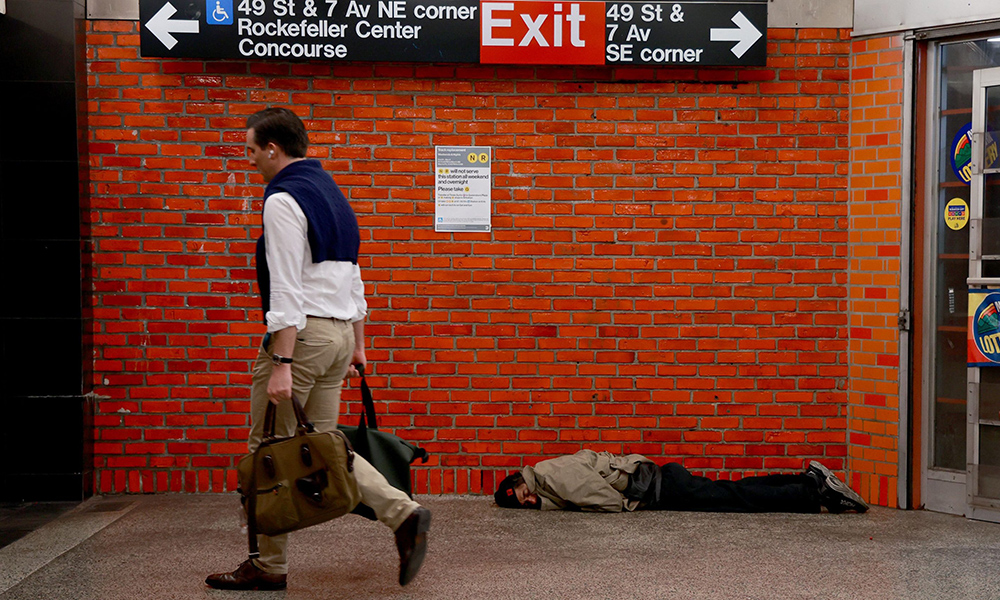
人們曾經(jīng)希望全球化和技術(shù)進(jìn)步可以推動社會創(chuàng)造一個更加公平的世界,,讓各個地方都擁有平等的機(jī)會,,而如今卻只能夠接受這樣的現(xiàn)實(shí):全球化和技術(shù)變革遠(yuǎn)非消除了距離,而是使得地點(diǎn)比以往任何時候都更加重要,。世界并不公平,,而且越來越不公平。
法律,、金融,、咨詢及相關(guān)行業(yè)的高薪工作集中分布在少數(shù)城市里。這些城市的生活讓普通人難以負(fù)擔(dān),,他們正在因?yàn)槭兄行呢毭駞^(qū)的士紳化而被擠出城市,。過去,由于產(chǎn)業(yè)和公司都聚集在水道,、煤礦廠或農(nóng)業(yè)中心等自然資源豐富的地方附近,,高薪工作的分布往往與地理位置相關(guān)。如今,,這些自然特質(zhì)變得不再重要,,因?yàn)楣径急晃搅俗杂闪鲃拥闹R工作者聚集的城市。而知識工作者喜歡聚集在士紳化的市中心區(qū)域或城郊社區(qū),,那里住著年齡相仿且志同道合的專業(yè)人士,,并且提供豐富的娛樂、餐飲,、健康和其他服務(wù),。這就導(dǎo)致了巨大的顛倒:窮人和手工企業(yè)的住房和作坊被改造成為年輕專業(yè)人士的家,,而他們自身則被迫離開市中心貧民區(qū)。這些以知識為基礎(chǔ)的超級明星城市的內(nèi)核已然蓬勃發(fā)展,。通過聚集專業(yè)服務(wù)繁榮起來的城市(例如新加坡和迪拜)亦是如此,。
然而,遠(yuǎn)程辦公打破了這些趨勢,。雖然遠(yuǎn)程辦公早已成為可能,,但因?yàn)樾鹿谝咔榈谋l(fā),固定工作時間的舊規(guī)則才得以摒棄,。在美國,、英國和歐洲大的部分地區(qū),那些無需到工作場所辦公的人現(xiàn)在平均每周通勤三天,,通常是周二到周四,。事實(shí)證明,員工使用辦公室時間的減少對城市的發(fā)展極具破壞性,。目前,,商業(yè)房地產(chǎn)行業(yè)正在遭受損失,城市稅收削減,,依賴高客流量的商店(從理發(fā)店到咖啡店)的生存能力也在下降,。公共交通系統(tǒng)的處境也同樣岌岌可危,正在大量流失資金,。
遠(yuǎn)程辦公的好處顯而易見,,它給員工帶來了更大的靈活性,并且可以減少數(shù)十億小時的通勤時間和碳排放,。不過,,短期內(nèi)的生產(chǎn)率提高很可能是一場幻覺。創(chuàng)造力源于面對面互動和意外的碰撞,。大多數(shù)工作實(shí)際上都是學(xué)徒制的,。技能、行為舉止和商業(yè)文化需要通過非正式互動來習(xí)得,,而不是在Zoom或Teams上開視頻會議就能夠?qū)W習(xí)到的,。由于將各種各樣的人匯聚一堂,工作場所還有助于加強(qiáng)社會凝聚力和緩解人們孤立無助的感覺,。靈活的工作時間讓人們可以投入工作以外的事情,,更好地實(shí)現(xiàn)工作與生活的平衡、減少通勤壓力,,以及獲得其他潛在好處,。然而,公司需要更謹(jǐn)慎地管理遠(yuǎn)程辦公,以確保這種制度不會損害個人,、公司和所有人賴以生存的城市的長遠(yuǎn)前景,。
一座城市如果缺乏活力,生產(chǎn)率,、凝聚力和創(chuàng)造力就都會下降,。繁榮興旺的城市是經(jīng)濟(jì)增長的引擎,也是應(yīng)對巨大挑戰(zhàn)的陣地,。為了讓更廣泛的群體享受到這些城市的好處,,我們需要更多負(fù)擔(dān)得起的住房和有效的公共交通系統(tǒng)、學(xué)校和其他服務(wù)設(shè)施,。然而,,隨著高薪階層的薪資和財富持續(xù)飆升,住房競爭日益激烈,,繁榮城市的生活變得越來越難以負(fù)擔(dān),。
由于買不起住房、通勤時間和成本增加以及學(xué)校和養(yǎng)老院數(shù)量不足,,繁榮城市對許多工薪族來說變得遙不可及,。因?yàn)閺囊粋€城市搬到另一個城市不易,當(dāng)代人比上一代人的流動性減半,,所以一些個人和群體只能夠困在前景黯淡的地方,。
生成式人工智能的興起可能會加劇不平等,因?yàn)樵絹碓蕉嘀貜?fù)性的人類工作正在日益被自動化系統(tǒng)取代,,而那些從事前沿技術(shù)、法律和金融服務(wù)行業(yè)的人的財富卻在增加,。收入的增加和人口結(jié)構(gòu)的改變將加速消費(fèi)和選擇的變化,。隨著支出對象從汽車和爐灶等制成品轉(zhuǎn)變?yōu)榘茨筒宛^等服務(wù),人口密集且多姿多彩的城市變得越來越具有吸引力,。由于婚育年齡推遲,,如今人們將更多的收入和時間用于享受充滿活力的城市社區(qū)里豐富多樣的休閑活動。
富有活力的城市與其他城市內(nèi)部及它們之間的不平等不斷加劇,,導(dǎo)致這些城市里的都市精英成為民粹主義者日益反對的對象,。要縮小日益擴(kuò)大的差距,并非要破壞活力城市的成功,,而是要讓這些城市的生活變得更加容易負(fù)擔(dān)和企及,。這意味著當(dāng)局應(yīng)該把資金用于建設(shè)公共住房和交通設(shè)施,以及創(chuàng)造更清潔和適宜步行的城市,。我們需要拋棄過時的模式,,即建造在夜晚閑置的毫無生氣的中心商業(yè)辦公區(qū),轉(zhuǎn)為打造集住房,、辦公室和休閑娛樂設(shè)施于一體的充滿生機(jī)的社區(qū),。將多余的辦公室改造成住宅或許可以加速這些發(fā)展過程,。許多城市都經(jīng)歷過特大洪水、火災(zāi)和高溫,,這也凸顯了將城市轉(zhuǎn)變?yōu)槲磥砜沙掷m(xù)的家園的迫切需要,。
城市擁有無限的創(chuàng)造潛力,給未來發(fā)展提供了源源不斷的希望,。通過攜手改善城市環(huán)境,,我們能夠激發(fā)城市的潛能,為所有人創(chuàng)造更美好的生活,。(財富中文網(wǎng))
伊恩·戈爾?。↖an Goldin)是牛津大學(xué)(Oxford University)的教授,與湯姆·李-德夫林(Tom Lee-Devlin)合著了《城市時代:為什么人類未來休戚與共》(Age of the City: Why Our Future Will be Won or Lost Together)一書,。
Fortune.com上發(fā)表的評論文章中表達(dá)的觀點(diǎn),,僅代表作者本人的觀點(diǎn),不代表《財富》雜志的觀點(diǎn)和立場,。
譯者:中慧言-劉嘉歡
人們曾經(jīng)希望全球化和技術(shù)進(jìn)步可以推動社會創(chuàng)造一個更加公平的世界,,讓各個地方都擁有平等的機(jī)會,而如今卻只能夠接受這樣的現(xiàn)實(shí):全球化和技術(shù)變革遠(yuǎn)非消除了距離,,而是使得地點(diǎn)比以往任何時候都更加重要,。世界并不公平,而且越來越不公平,。
法律,、金融、咨詢及相關(guān)行業(yè)的高薪工作集中分布在少數(shù)城市里,。這些城市的生活讓普通人難以負(fù)擔(dān),,他們正在因?yàn)槭兄行呢毭駞^(qū)的士紳化而被擠出城市。過去,,由于產(chǎn)業(yè)和公司都聚集在水道,、煤礦廠或農(nóng)業(yè)中心等自然資源豐富的地方附近,高薪工作的分布往往與地理位置相關(guān),。如今,,這些自然特質(zhì)變得不再重要,因?yàn)楣径急晃搅俗杂闪鲃拥闹R工作者聚集的城市,。而知識工作者喜歡聚集在士紳化的市中心區(qū)域或城郊社區(qū),,那里住著年齡相仿且志同道合的專業(yè)人士,并且提供豐富的娛樂,、餐飲,、健康和其他服務(wù)。這就導(dǎo)致了巨大的顛倒:窮人和手工企業(yè)的住房和作坊被改造成為年輕專業(yè)人士的家,而他們自身則被迫離開市中心貧民區(qū),。這些以知識為基礎(chǔ)的超級明星城市的內(nèi)核已然蓬勃發(fā)展,。通過聚集專業(yè)服務(wù)繁榮起來的城市(例如新加坡和迪拜)亦是如此。
然而,,遠(yuǎn)程辦公打破了這些趨勢,。雖然遠(yuǎn)程辦公早已成為可能,但因?yàn)樾鹿谝咔榈谋l(fā),,固定工作時間的舊規(guī)則才得以摒棄,。在美國、英國和歐洲大的部分地區(qū),,那些無需到工作場所辦公的人現(xiàn)在平均每周通勤三天,,通常是周二到周四。事實(shí)證明,,員工使用辦公室時間的減少對城市的發(fā)展極具破壞性,。目前,商業(yè)房地產(chǎn)行業(yè)正在遭受損失,,城市稅收削減,,依賴高客流量的商店(從理發(fā)店到咖啡店)的生存能力也在下降。公共交通系統(tǒng)的處境也同樣岌岌可危,,正在大量流失資金,。
遠(yuǎn)程辦公的好處顯而易見,它給員工帶來了更大的靈活性,,并且可以減少數(shù)十億小時的通勤時間和碳排放,。不過,短期內(nèi)的生產(chǎn)率提高很可能是一場幻覺,。創(chuàng)造力源于面對面互動和意外的碰撞,。大多數(shù)工作實(shí)際上都是學(xué)徒制的。技能,、行為舉止和商業(yè)文化需要通過非正式互動來習(xí)得,而不是在Zoom或Teams上開視頻會議就能夠?qū)W習(xí)到的,。由于將各種各樣的人匯聚一堂,,工作場所還有助于加強(qiáng)社會凝聚力和緩解人們孤立無助的感覺。靈活的工作時間讓人們可以投入工作以外的事情,,更好地實(shí)現(xiàn)工作與生活的平衡,、減少通勤壓力,以及獲得其他潛在好處,。然而,,公司需要更謹(jǐn)慎地管理遠(yuǎn)程辦公,以確保這種制度不會損害個人、公司和所有人賴以生存的城市的長遠(yuǎn)前景,。
一座城市如果缺乏活力,,生產(chǎn)率、凝聚力和創(chuàng)造力就都會下降,。繁榮興旺的城市是經(jīng)濟(jì)增長的引擎,,也是應(yīng)對巨大挑戰(zhàn)的陣地。為了讓更廣泛的群體享受到這些城市的好處,,我們需要更多負(fù)擔(dān)得起的住房和有效的公共交通系統(tǒng),、學(xué)校和其他服務(wù)設(shè)施。然而,,隨著高薪階層的薪資和財富持續(xù)飆升,,住房競爭日益激烈,繁榮城市的生活變得越來越難以負(fù)擔(dān),。
由于買不起住房,、通勤時間和成本增加以及學(xué)校和養(yǎng)老院數(shù)量不足,繁榮城市對許多工薪族來說變得遙不可及,。因?yàn)閺囊粋€城市搬到另一個城市不易,,當(dāng)代人比上一代人的流動性減半,所以一些個人和群體只能夠困在前景黯淡的地方,。
生成式人工智能的興起可能會加劇不平等,,因?yàn)樵絹碓蕉嘀貜?fù)性的人類工作正在日益被自動化系統(tǒng)取代,而那些從事前沿技術(shù),、法律和金融服務(wù)行業(yè)的人的財富卻在增加,。收入的增加和人口結(jié)構(gòu)的改變將加速消費(fèi)和選擇的變化。隨著支出對象從汽車和爐灶等制成品轉(zhuǎn)變?yōu)榘茨筒宛^等服務(wù),,人口密集且多姿多彩的城市變得越來越具有吸引力,。由于婚育年齡推遲,如今人們將更多的收入和時間用于享受充滿活力的城市社區(qū)里豐富多樣的休閑活動,。
富有活力的城市與其他城市內(nèi)部及它們之間的不平等不斷加劇,,導(dǎo)致這些城市里的都市精英成為民粹主義者日益反對的對象。要縮小日益擴(kuò)大的差距,,并非要破壞活力城市的成功,,而是要讓這些城市的生活變得更加容易負(fù)擔(dān)和企及。這意味著當(dāng)局應(yīng)該把資金用于建設(shè)公共住房和交通設(shè)施,,以及創(chuàng)造更清潔和適宜步行的城市,。我們需要拋棄過時的模式,即建造在夜晚閑置的毫無生氣的中心商業(yè)辦公區(qū),,轉(zhuǎn)為打造集住房,、辦公室和休閑娛樂設(shè)施于一體的充滿生機(jī)的社區(qū),。將多余的辦公室改造成住宅或許可以加速這些發(fā)展過程。許多城市都經(jīng)歷過特大洪水,、火災(zāi)和高溫,,這也凸顯了將城市轉(zhuǎn)變?yōu)槲磥砜沙掷m(xù)的家園的迫切需要。
城市擁有無限的創(chuàng)造潛力,,給未來發(fā)展提供了源源不斷的希望,。通過攜手改善城市環(huán)境,我們能夠激發(fā)城市的潛能,,為所有人創(chuàng)造更美好的生活,。(財富中文網(wǎng))
伊恩·戈爾丁(Ian Goldin)是牛津大學(xué)(Oxford University)的教授,,與湯姆·李-德夫林(Tom Lee-Devlin)合著了《城市時代:為什么人類未來休戚與共》(Age of the City: Why Our Future Will be Won or Lost Together)一書,。
Fortune.com上發(fā)表的評論文章中表達(dá)的觀點(diǎn),僅代表作者本人的觀點(diǎn),,不代表《財富》雜志的觀點(diǎn)和立場,。
譯者:中慧言-劉嘉歡
The hope that globalization and technological progress would generate a world that is flat, in which opportunity is spread more evenly, has given way to a realization that far from the death of distance, globalization and technological change have made place more important than ever. The world is not flat–it is increasingly spiky.
Highly paid jobs in legal, financial, consulting, and associated professions are clustered in a small number of cities. These are unaffordable to ordinary people, who are being squeezed out by gentrified inner cities. In the past, well-paid jobs were more distributed geographically, as industries and firms clustered around natural resources such as waterways, coal mines, or agricultural centers. These natural attributes no longer matter as firms are attracted to cities where footloose knowledge workers congregate. And knowledge workers want to congregate where similarly aged like-minded professionals live, in gentrified downtown areas or suburban neighborhoods that offer an abundance of entertainment, food, health, and other options. This is leading to a great inversion, in which poor people and artisanal businesses are being pushed out of inner cities with their homes and workshops being converted into homes for young professionals. The inner cores of these superstar knowledge-based cities have flourished. So too have the cities that have thrived by connecting professional services, such as Singapore or Dubai.
Remote work has disrupted these trends. While this has long been possible, the pandemic allowed old rules around regular hours to be jettisoned. In the U.S., U.K., and much of Europe, those not required at a workplace now commute on average three days a week, typically Tuesday to Thursday. The collapsing commitment to offices is proving to be highly disruptive for cities. Commercial real estate is suffering, municipal taxes are declining, and the viability of businesses that depend on intense footfall–from barbers to baristas–is being undermined. Public transport systems are in a similarly precarious position, hemorrhaging cash.
The benefits of remote work were immediately apparent in greater flexibility and billions of hours in saved commuting time and carbon emissions. However, the short-term productivity gains may well be illusory. Creativity thrives on physical interactions and serendipitous encounters. Most jobs are really apprenticeships. Skills, behaviors, and business cultures are learned through informal interactions which cannot be taught on Zoom or Teams. By bringing diverse people together, workplaces also help build social cohesion and reduce isolation and loneliness. Flexible hours can enable people to meet commitments outside of work and enjoy a better work-life balance and less stressful commuting, among other potential benefits. However, remote work needs to be managed more carefully to ensure that it does not undermine the longer-term prospects for individuals, firms, and the cities on which we all depend.
A society without dynamic cities would be less productive, less cohesive, and less creative. Thriving cities are the engines of our economies and the places where the solutions to our greatest challenges are to be found. To ensure that the benefits of these cities are more widely shared, we need more affordable homes and effective public transport systems, schools, and other services. However, successful cities are becoming unaffordable, due to the soaring salaries and wealth of those who have high-paid jobs and increasing competition for accommodation.
The inability to afford homes, the time and cost of commuting, and the shortage of school and elderly care places have put flourishing cities out of reach for many working people. The difficulties of moving from one city to another means that people are half as mobile as they were a generation ago, locking individuals and communities into places that have fading prospects.
The rise of generative AI is likely to compound this divide as automated systems increasingly substitute for a widening range of repetitive human tasks and increase the wealth for those at the frontier of technology, law, and financial services. Rising incomes and changing demographics will accelerate changes in consumption and choices. As expenditure shifts from manufactured goods, such as cars and stoves, to services such as massages and restaurants, the magnetism of dense and diverse cities grows. As the age of marriage and having children rises, a greater share of income and time is spent enjoying the diverse pastimes that dynamic city neighborhoods offer in abundance.
The growing inequality within and between dynamic cities and other places means they are the target of a growing populist backlash against metropolitan elites. The answer to the growing divide is not to undermine the success of dynamic cities. Rather, it is in making them more affordable and accessible. This means investing in public housing and transport and in creating cleaner, walkable cities. We need to move away from the outdated model of sterile central business districts of offices that lay empty at night to create vibrant mixed residential, office, and entertainment neighborhoods. The conversion of surplus offices into residential accommodation offers an opportunity to fast-track these developments. The experience of extreme floods, fires, and heat in many cities also highlights the urgent need for transforming cities into our sustainable homes for the future.
Cities, with their unbounded creative potential, provide a source of hope for the future. By working together to improve them, we can realize their potential to create a better life for all.
Ian Goldin is a professor at Oxford University and together with Tom Lee-Devlin a co-author of Age of the City: Why Our Future Will be Won or Lost Together.
The opinions expressed in Fortune.com commentary pieces are solely the views of their authors and do not necessarily reflect the opinions and beliefs of Fortune.






